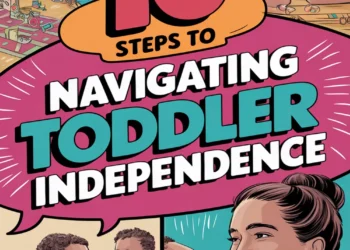To effectively boost your toddler’s language skills, engage them in interactive reading sessions, use music and songs, and encourage playful conversations. Create a language-rich environment by incorporating descriptive language in daily interactions and limiting screen time. Utilize visual aids and props to enhance learning, while fostering imaginative play to introduce new vocabulary. Be an active listener, responding appropriately to support their communication. Explore more methods that can enrich your toddler’s language development and spark their interest in words.
Engage in Interactive Reading Sessions
While many parents might think reading is a passive activity, engaging in interactive reading sessions can greatly boost your toddler’s language skills. When you take the time to ask questions about the story, encourage your child to predict what happens next, or relate the narrative to their own experiences, you’re making reading a two-way communication. Research shows that these interactive strategies foster vocabulary growth and comprehension. Additionally, pointing out pictures or words together stimulates their curiosity and understanding. Incorporate various books, use expressive voices, and let your toddler turn pages. This hands-on approach not only keeps their attention but also makes learning fun. Ultimately, every moment spent in interactive reading nurtures a love for language, laying a strong foundation for their future communication skills.
Utilize Music and Songs for Language Learning
Incorporating music and songs into your toddler’s daily routine can greatly enhance their language skills. Research shows that melodies and rhythms help children grasp new vocabulary and concepts more easily. Singing familiar songs or lullabies not only captivates their attention but also boosts memory retention. Try singing while you play, or use interactive songs that involve hand movements—this promotes physical engagement alongside language development. Consider using genres that introduce different themes and vocabulary, like children’s folk songs or nursery rhymes. Play music during activities like mealtime or bath time to create a lively environment. By consistently integrating music and songs, you’re making learning enjoyable, fostering both language acquisition and a love for communication in your toddler.
Encourage Playful Conversations
Creating playful conversations with your toddler can greatly enhance their language development and communication skills. Engage them in lighthearted dialogue that invites them to share their thoughts and feelings. Use fun scenarios, like pretending to be animals or characters, which makes conversation enjoyable and memorable. Ask open-ended questions, encouraging your little one to think and elaborate, fostering their verbal expression. Incorporate familiarity by discussing their favorite activities or toys, prompting them to describe experiences in detail. Celebrate their attempts by actively listening and responding, reinforcing their confidence in using language. By weaving play into everyday discussions, you not only boost their vocabulary but also strengthen your bond, making communication a joyful priority in their early developmental stages.
Create a Language-rich Environment
A rich language environment can greatly boost your toddler’s linguistic growth. Surround your child with varied vocabulary by reading books, singing songs, and having conversations throughout the day. Use descriptive language when you talk about everyday things—this helps your toddler make connections and build their own language skills. Label objects around the house and point them out during playtime, encouraging your child to expand their vocabulary. Create opportunities for storytelling and encourage your little one to share their thoughts and feelings. Limit screen time and prioritize interactive activities that promote verbal expression. By fostering a language-rich environment, you’re helping your toddler develop confidence and communication skills that will benefit them for years to come.
Use Everyday Moments as Learning Opportunities
Everyday moments provide a fantastic backdrop for language development, allowing your toddler to learn naturally as they engage with their surroundings. Whether it’s during mealtimes, bath time, or grocery shopping, these experiences offer rich opportunities for conversation. Talk about what you’re doing, name objects, and describe actions. For instance, while playing with blocks, you can explain colors, shapes, or sizes. Encourage your toddler to ask questions, too; this nurtures curiosity and promotes language use. Consistency matters—make it a habit to narrate daily activities, helping your toddler absorb new vocabulary effortlessly. Research shows that these interactions strengthen comprehension and spoken skills, making language learning a fun and integral part of your child’s day. Embrace these moments; they’re invaluable for growth!
Introduce New Words Through Storytelling
While you share stories with your toddler, you’re not just entertaining them; you’re also introducing a world of new words. Storytelling is an excellent way to expand your child’s vocabulary and enhance comprehension. Choose books with rich language and vivid imagery. As you read, pause to discuss illustrations, ask questions, and encourage your toddler to predict what happens next. This interaction helps reinforce the new words they’re hearing.
Here’s a quick reference table for effective storytelling techniques:
| Technique | Purpose | Example |
|---|---|---|
| Vocabulary Expansion | Introduce new words | Use “enormous” instead of “big” |
| Visual Cues | Stimulate imagination | Point to colorful images |
| Questioning | Encourage critical thinking | “What do you think will happen next?” |
Recommended Items
Discover our favorite tools and products to support your toddler’s language development—let’s dive in!
Products
Implement Sign Language for Early Communication
Incorporating sign language into your toddler’s daily routine can greatly enhance their early communication skills. Studies show that using signs can bridge the gap between your child’s thoughts and verbal expression, reducing frustration and encouraging bonding.
Here are a few ways to integrate sign language effectively:
- Use consistent signs for daily routines, like “more” during meals or “all done” when finished.
- Combine speech and signs to reinforce learning; say the word while showing the sign.
- Make it fun! Use songs and games to keep your toddler engaged and interested in learning.
Action Steps for Boosting Toddler Language Skills
Make Use of Rhymes and Patterns
Using rhymes and patterns in your toddler’s language development can make learning enjoyable and memorable. Research shows that kids are naturally drawn to rhythm and repetition, which can enhance their vocabulary and comprehension. You might start by reading nursery rhymes, singing songs, or creating simple poetic phrases. These fun activities help build phonemic awareness and make it easier for your child to recognize sounds and syllables.
Encourage your toddler to join in by repeating phrases or filling in missing words. This interactive approach not only engages their attention but also boosts their confidence in using language. Remember, the more fun and playful you make these activities, the more likely your child will develop a love for words and stories.
Play Language Development Games
Playing language development games can make a significant difference in your toddler’s communication skills. These interactive activities not only engage your little one but also nurture their vocabulary and comprehension. Research shows that children learn best through play, and incorporating fun games can enhance their linguistic abilities.
Consider these engaging language games:
- Simon Says: Encourages following instructions and improves vocabulary.
- I Spy: Boosts observational skills while expanding word use.
- Storytelling Puppets: Encourages narrative skills and creativity using puppets.
Incorporate Visual Aids and Props
While you interact with your toddler, integrating visual aids and props can greatly enhance their language skills. Research shows that children learn better when they can see and touch objects related to language. Use colorful books, toys, and flashcards to create engaging learning experiences. For example, when reading a book about animals, hold up toy animals to illustrate the story. This multi-sensory approach helps toddlers make connections between words and their meanings. Don’t forget to encourage your toddler to point, touch, and name the props. This active participation reinforces their learning and boosts confidence. When you incorporate these visual aids into daily interactions, you’re not just talking; you’re creating a rich, supportive environment that fosters language development.
Foster Imaginative Play to Enhance Vocabulary
Engaging in imaginative play can greatly boost your toddler’s vocabulary. When your child pretends to be different characters or situations, they naturally experiment with new words and phrases. This type of play encourages creativity while helping them make connections between their experiences and language.
Here are some effective ways to foster imaginative play:
- Role-playing: Act out everyday activities like shopping or cooking to introduce new terms.
- Storytelling: Use props to tell stories, allowing your toddler to expand their narrative skills and vocabulary.
- Creative arts: Engage in drawing or crafts where your child can describe their creations using specific language.
Be an Active Listener and Respond Appropriately
When you actively listen to your toddler, you’re not just hearing their words; you’re validating their thoughts and feelings, which is essential for language development. By giving them your full attention, you show that what they say matters, encouraging richer conversations. Responding appropriately—whether through nodding, asking follow-up questions, or rephrasing their ideas—helps expand their vocabulary and comprehension. For example, if they say, “I see a big dog,” you can respond, “Yes, that’s a big dog! Is it barking?” This kind of dialogue stimulates their thinking and encourages them to express themselves more. Remember, your engagement builds their confidence in using language, setting the stage for effective communication as they grow. So, be present and responsive!
Limit Screen Time and Promote Direct Interaction
Studies show that limiting screen time can considerably enhance your toddler’s language skills. When kids engage less with screens and more with people, they become better communicators. Direct interaction encourages them to express themselves, ask questions, and develop critical thinking skills.
Consider these strategies:
- Create tech-free zones: Make mealtime or playtime screen-free to foster direct conversation.
- Engage in storytelling: Share stories together and encourage your toddler to contribute ideas and ask questions.
- Play interactive games: Choose games that require verbal participation, promoting cooperation and language use.













